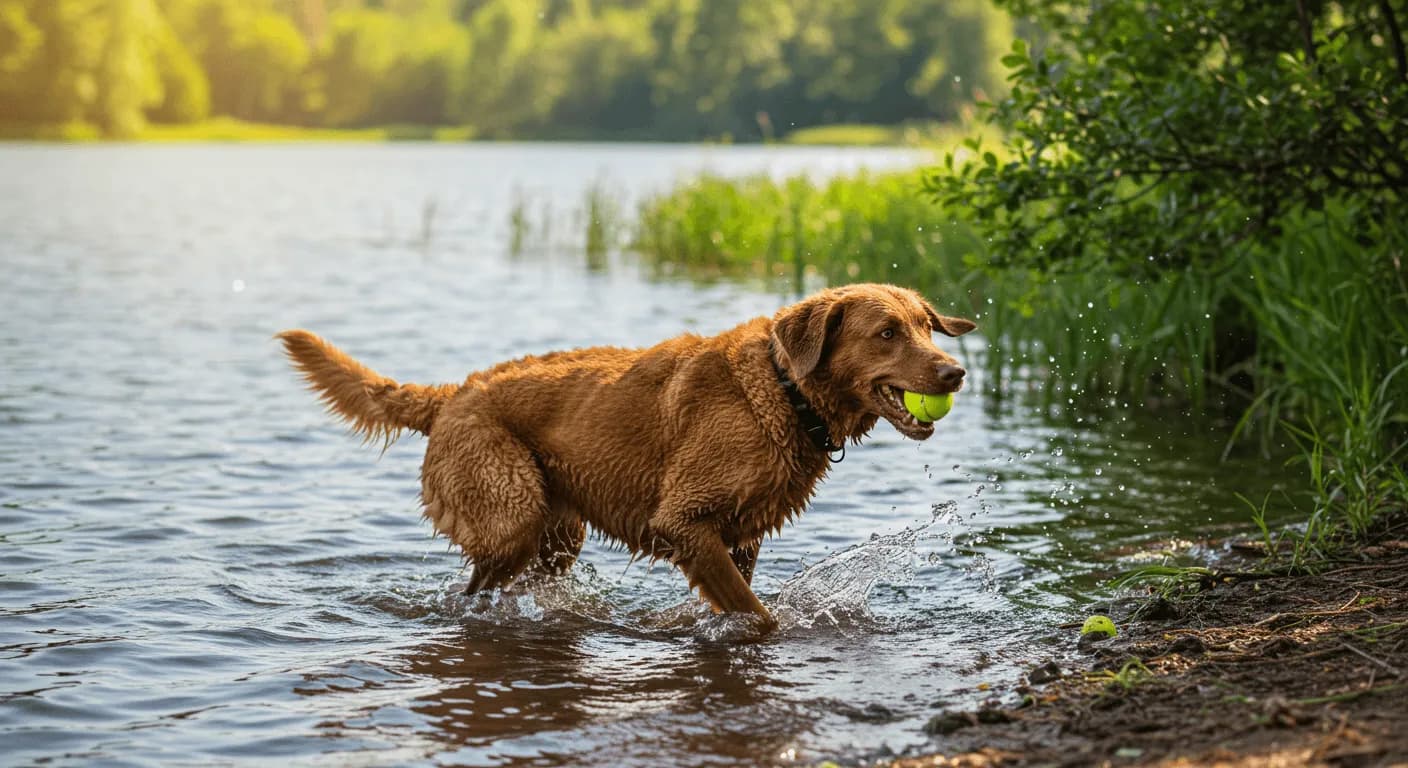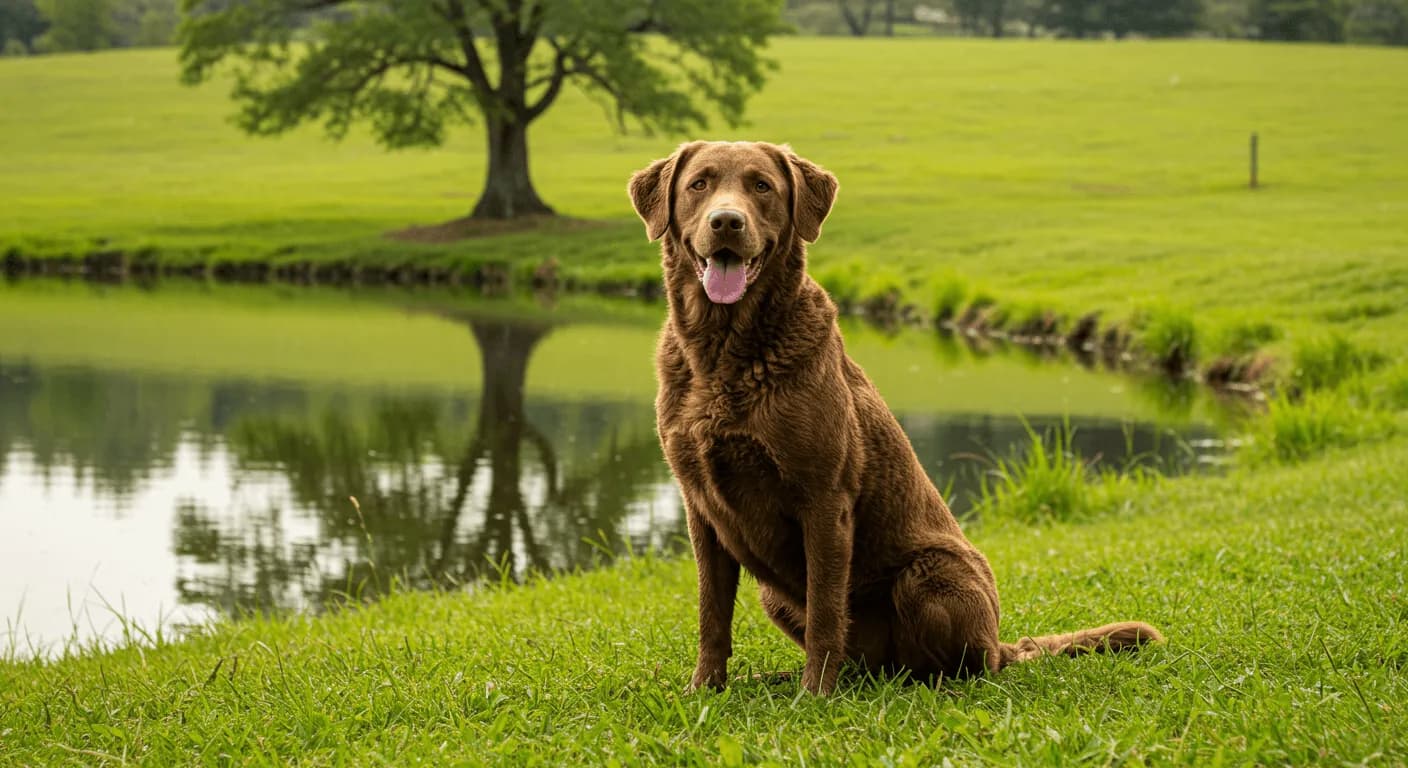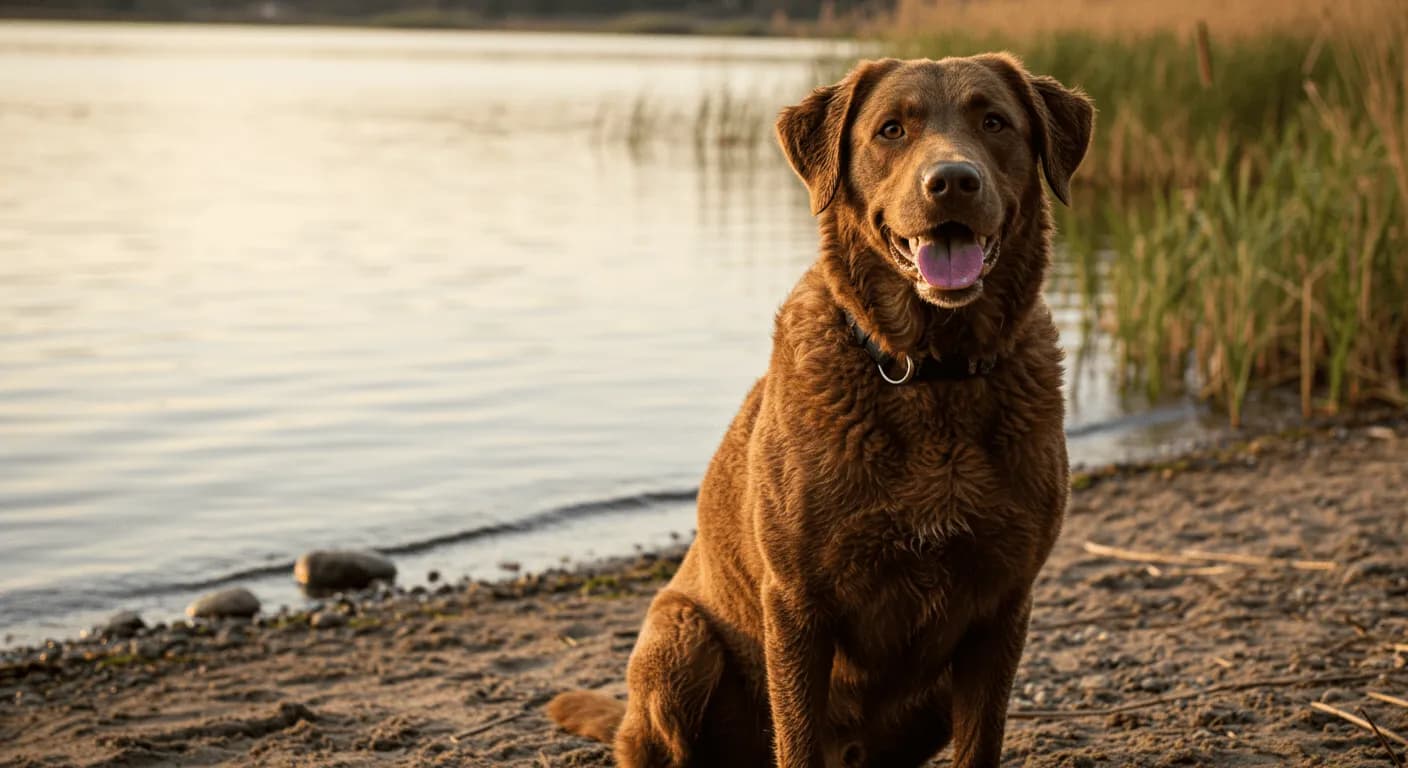The Chesapeake Bay Retriever, often affectionately called the "Chessie," is a powerful and intelligent sporting dog known for its strong work ethic and devotion to family. Originally bred in the United States for retrieving waterfowl in the icy waters of the Chesapeake Bay, this dog has a rugged, resilient personality that’s matched by an affectionate heart. As one of the few truly American dog breeds, the Chesapeake Bay Retriever carries with it a spirit of loyalty, determination, and a love for the great outdoors.
With such a distinctive set of traits and needs, the big question for prospective dog owners is: Is a Chesapeake Bay Retriever right for me? This article will provide a deep dive into the breed’s temperament, care requirements, compatibility with various lifestyles, and everything else you need to consider before bringing a Chessie into your home.
Temperament and Personality
Chesapeake Bay Retrievers are known for their strength, intelligence, and loyalty. These dogs have historically been working partners for hunters and fishermen, so their attitude reflects discipline and purpose.
Common Behavioral Traits:
- Loyal and protective: Chessies are devoted to their families and can be discerning around strangers.
- Independent: Unlike some retriever breeds that obsess over pleasing, Chessies can be stubborn and prefer doing things their own way.
- Loving but reserved: While they are deeply affectionate, especially with their primary human companions, they are not overly sociable with strangers.
Energy Levels & Social Tendencies:
Chessies are active and athletic. They need a significant amount of physical and mental stimulation. Left to their own devices, they might become destructive out of boredom. Socialization from an early age is crucial to ensure they don’t become overprotective or aloof.

Pros and Cons for Different People
When trying to determine whether a Chesapeake Bay Retriever fits into your life, it’s important to consider your lifestyle. This breed isn’t a one-size-fits-all pet.
Families with Children:
- Chessies typically do well with children, especially if raised with them.
- They are protective and can become wonderful family guardians.
- However, due to their high energy and muscular build, supervision is important around small children.
Single Individuals:
- A great companion for a committed and active single person.
- Suitable for those who spend a lot of time outdoors or have a large property.
- Not ideal for someone whose lifestyle includes long hours away from home.
Elderly Owners:
- The high energy and need for consistent exercise might be overwhelming.
- Training a stubborn or independent Chessie may be more physically demanding than other breeds.
Active Lifestyles vs. Sedentary Lifestyles:
- This is definitely a breed for the active lifestyle.
- Chessies thrive on frequent exercise, outdoor adventures, and mentally engaging tasks like agility, obedience training, or hunting.
- For someone who enjoys hikes, running, or water sports, a Chessie can be a perfect partner.
- For sedentary households or owners with limited mobility, this breed could be too high-maintenance.
Suitability Factors
To help make the right decision, let’s break down specific factors that can affect whether a Chesapeake Bay Retriever aligns with your home environment and lifestyle.
Are Chesapeake Bay Retrievers good with kids?
Yes, especially when socialized early. Their loyal and protective nature makes them excellent companions for children. However, their size and exuberance demand caution with smaller toddlers.
Are Chesapeake Bay Retrievers good with other dogs?
Their behavior with other dogs can vary. With proper socialization, many Chessies get along well with other dogs. However, same-sex aggression has been reported in some cases, especially among unneutered males.
Are Chesapeake Bay Retrievers good with cats?
They may not be ideal in homes with cats unless they are raised together from puppyhood. Their prey drive can kick in around small animals, including cats, unless careful and early introductions are made.
Are Chesapeake Bay Retrievers good guard dogs?
Yes, they make excellent watchdogs. Unlike some retrievers that greet strangers with wagging tails, Chessies can be more reserved and protective, issuing a warning bark when they notice unfamiliar activity.
Are Chesapeake Bay Retrievers good for apartments?
Generally, no. Their high energy and size make them more suited to homes with large yards or access to open spaces. Small living quarters without sufficient outlets for their energy can lead to behavioral issues.
Do Chesapeake Bay Retrievers need a yard?
Absolutely. A secure, fenced-in yard allows them to play, explore, and expend energy, which is crucial for their mental health.
Is a Chesapeake Bay Retriever good for first-time owners?
Not typically. First-time owners may find the breed’s stubborn streak and high activity level hard to handle. Experienced dog owners who are confident in training and setting firm boundaries are better equipped for this breed.

Care Requirements
When you bring a Chessie into your home, you're committing to a dog that needs physical activity, mental engagement, and consistent training.
Exercise Needs:
- Adult Chesapeake Bay Retrievers need at least 60-90 minutes of intense exercise daily.
- Activities like swimming, hiking, and field games are ideal.
- Puppies and young dogs may require multiple short play sessions throughout the day.
Grooming Requirements:
- Despite their thick coat, grooming is relatively low maintenance.
- Their dense, oily double coat provides water resistance but does shed moderately, especially in spring and fall.
- Weekly brushing helps manage shedding and keeps the coat healthy.
- Baths should be infrequent since they remove the skin’s natural oils.
- Drooling is typically minimal.
Training Considerations:
- Consistency and positive reinforcement are key.
- Early obedience training and socialization are critical to curb stubbornness.
- They can bark at perceived threats or when bored, but they’re not constant barkers.
- Training sessions should be mentally stimulating to avoid boredom.
Can Chesapeake Bay Retrievers live outside?
While they were bred to tolerate cold weather and can spend time outside, they should not be left alone outdoors for extended periods. Chessies thrive on human companionship and need to feel like part of the family.
Can Chesapeake Bay Retrievers be left alone?
They can tolerate being alone for moderate periods if their physical and emotional needs are met beforehand. Yet, frequent or prolonged isolation can lead to boredom and destructive behaviors.
Are Chesapeake Bay Retrievers high maintenance?
Moderately so. Grooming isn’t a huge task, but their exercise and training demands are significant. They do best in homes where their needs won't regularly be compromised.
Health and Lifespan
Understanding the health profile of a breed is essential for long-term planning and commitment.
Common Health Issues:
Chesapeake Bay Retrievers are generally healthy, but like all breeds, they are prone to certain conditions, such as:
- Hip dysplasia
- Progressive retinal atrophy (PRA)
- Degenerative myelopathy
- Gastric torsion (bloat)
- Elbow dysplasia
Responsible breeders screen for these diseases and avoid breeding affected individuals.
Chesapeake Bay Retriever Life Expectancy:
These dogs generally live around 10 to 13 years. With proper health care, regular vet visits, and a quality diet, many Chessies enjoy long, active lives.
Are Chesapeake Bay Retrievers hypoallergenic?
No. While they do not drool much, they shed and can trigger allergies in sensitive individuals. Their dander and fur make them unsuitable for allergy sufferers.
Cost and Legal Considerations
Bringing a Chesapeake Bay Retriever into your life involves several financial and legal commitments.
How much does a Chesapeake Bay Retriever cost?
The cost for a Chesapeake Bay Retriever puppy from a reputable breeder can range from $800 to $2,500, depending on the dog’s pedigree, breeder reputation, and geographic location.
In addition to the purchase price, annual ownership costs (including food, grooming, vaccines, checkups, training, insurance, and accessories) can range from $1,500 to $2,500 per year.
Legal Restrictions (if any):
Chessies typically aren't subject to breed-specific legislation (BSL). However, it’s always wise to check with local homeowners associations, city or county ordinances, and lease agreements to confirm there are no restrictions. Also, check your homeowner’s insurance to confirm whether the breed might affect your coverage.
Quick Checklist for Potential Chesapeake Bay Retriever Owners
Here’s a brief ordered list to summarize your readiness:
- Do you have at least 1-2 hours daily for exercise/training?
- Can you provide socialization and strong leadership?
- Do you live in a home with space or access to open areas?
- Can you afford veterinary, food, and ownership costs?
- Are you confident handling large, independent breeds?
If you answered “yes” to most, a Chesapeake Bay Retriever might be the match for you.
Key advantages of Chesapeake Bay Retrievers:
- Extremely loyal and protective
- Intelligent and trainable with the right approach
- Great for active and outdoor-loving individuals
- Hardy and capable of handling cold climates
- Excellent swimmers
Possible challenges to consider:
- Not ideal for first-time dog owners
- Needs lots of exercise and mental stimulation
- Can be stubborn and territorial
- Requires regular training and socialization
- Not usually apartment-friendly
Stay tuned for the Conclusion section, where we'll summarize everything and help you finalize your decision on this remarkable breed.
Conclusion
The Chesapeake Bay Retriever is a remarkable breed—strong, intelligent, and deeply loyal. With its origins as a hardworking waterfowl retriever, this dog loves challenges and thrives in active, outdoor environments. For the right owner, a Chessie offers unwavering companionship, excellent watchdog instincts, and a drive to please that shines through once trust is established.
However, it's essential to recognize that this breed isn’t suited for everyone. Their need for daily exercise, mental stimulation, and firm but respectful guidance can be overwhelming for first-time or less active dog owners. Their independent streak, combined with strong protective instincts, means they need consistent training and socialization to become balanced members of the family.
If you’re an experienced dog owner with time, space, and energy to dedicate to an intelligent and hard-working companion, the Chesapeake Bay Retriever could be a perfect addition to your household. They’re not just pets—they're devoted partners who will stand beside you through thick and thin.
Ultimately, choosing to welcome a Chesapeake Bay Retriever into your life is a decision that should be made with care, commitment, and a deep appreciation for everything this powerful and noble breed has to offer.


